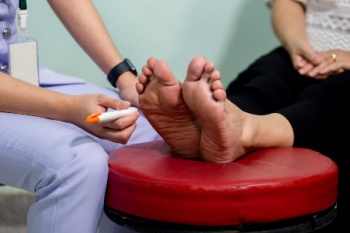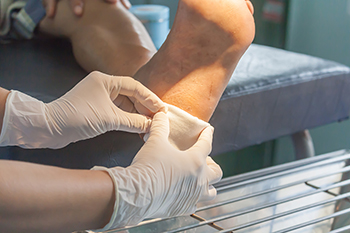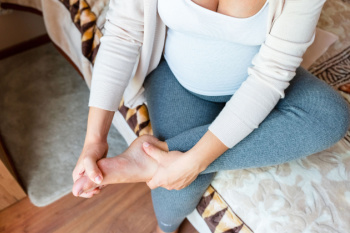
Foot neuropathy, a nerve disorder, presents a variety of challenges for individuals experiencing symptoms. Neuropathy occurs when nerves in the feet are damaged, leading to sensations of numbness, tingling, burning, or sharp pain. This condition can significantly impair mobility and diminish quality of life. Diagnosing foot neuropathy involves a comprehensive evaluation by a podiatrist, typically starting with a thorough medical history and physical examination. This foot doctor may perform various tests to assess nerve function and rule out other potential causes of foot symptoms, such as diabetes or vitamin deficiencies. Electromyography, or EMG, nerve conduction studies, and imaging tests, such as MRI scans or ultrasounds, may be used to confirm the diagnosis and determine the extent of nerve damage. Early detection and diagnosis of foot neuropathy are essential for initiating appropriate treatment strategies aimed at managing symptoms, preventing further nerve damage, and improving overall foot health and function. If you have any of the above symptoms in your feet, it is strongly suggested that you visit a podiatrist who can help you to manage neuropathy.
Neuropathy
Neuropathy can be a potentially serious condition, especially if it is left undiagnosed. If you have any concerns that you may be experiencing nerve loss in your feet, consult with one of our podiatrists from Mercer Ocean Podiatry. Our doctors will assess your condition and provide you with quality foot and ankle treatment for neuropathy.
What Is Neuropathy?
Neuropathy is a condition that leads to damage to the nerves in the body. Peripheral neuropathy, or neuropathy that affects your peripheral nervous system, usually occurs in the feet. Neuropathy can be triggered by a number of different causes. Such causes include diabetes, infections, cancers, disorders, and toxic substances.
Symptoms of Neuropathy Include:
- Numbness
- Sensation loss
- Prickling and tingling sensations
- Throbbing, freezing, burning pains
- Muscle weakness
Those with diabetes are at serious risk due to being unable to feel an ulcer on their feet. Diabetics usually also suffer from poor blood circulation. This can lead to the wound not healing, infections occurring, and the limb may have to be amputated.
Treatment
To treat neuropathy in the foot, podiatrists will first diagnose the cause of the neuropathy. Figuring out the underlying cause of the neuropathy will allow the podiatrist to prescribe the best treatment, whether it be caused by diabetes, toxic substance exposure, infection, etc. If the nerve has not died, then it’s possible that sensation may be able to return to the foot.
Pain medication may be issued for pain. Electrical nerve stimulation can be used to stimulate nerves. If the neuropathy is caused from pressure on the nerves, then surgery may be necessary.
If you have any questions, please feel free to contact our offices located in Hamilton, Toms River, and Plainsboro Township, NJ . We offer the newest diagnostic and treatment technologies for all your foot care needs.

Pickleball, a fast-paced and exhilarating sport, can occasionally lead to foot and ankle injuries that require attention and proper care. One common injury is ankle sprains, resulting from sudden changes in direction or awkward landings while maneuvering around the court. Plantar fasciitis, characterized by inflammation of the thick band of tissue running across the bottom of the foot, may develop due to repetitive jumping and running movements. Additionally, stress fractures can occur in the bones of the foot or ankle, typically from overuse or excessive impact during gameplay. Achilles tendonitis, an inflammation of the Achilles tendon at the back of the ankle, can also arise from repetitive movements like lunging and pivoting. Proper warm-up routines, supportive footwear, and paying attention to technique can help reduce the risk of these injuries. If injury occurs, prompt medical evaluation and appropriate treatment are essential for recovery and returning to the pickleball court safely. If you have developed a foot or ankle injury while playing pickleball, it is suggested that you contact a podiatrist who can offer you a treatment plan that is right for you.
Ankle and foot injuries are common among athletes and in many sports. They can be caused by several problems and may be potentially serious. If you are feeling pain or think you were injured in a sporting event or when exercising, consult with one of our podiatrists from Mercer Ocean Podiatry. Our doctors will assess your condition and provide you with quality foot and ankle treatment.
Common Injuries
The most common injuries that occur in sporting activities include:
- Achilles Tendonitis
- Achilles Tendon Rupture
- Ankle Sprains
- Broken Foot
- Plantar Fasciitis
- Stress Fractures
- Turf Toe
Symptoms
Symptoms vary depending upon the injury and in some cases, there may be no symptoms at all. However, in most cases, some form of symptom is experienced. Pain, aching, burning, bruising, tenderness, tightness or stiffness, sensation loss, difficulty moving, and swelling are the most common symptoms.
Treatment
Just as symptoms vary depending upon the injury, so do treatment options. A common treatment method is known as the RICE method. This method involves rest, applying ice, compression and elevating the afflicted foot or ankle. If the injury appears to be more serious, surgery might be required, such as arthroscopic or reconstructive surgery. Lastly, rehabilitation or therapy might be needed to gain full functionality in the afflicted area. Any discomfort experienced by an athlete must be evaluated by a licensed, reputable medical professional.
If you have any questions, please feel free to contact our offices located in Hamilton, Toms River, and Plainsboro Township, NJ . We offer the newest diagnostic and treatment technologies for all your foot care needs.

Diabetics can reduce the risk of developing foot ulcers by adopting proactive foot care measures. Regularly inspecting the feet for any signs of injury, such as cuts, blisters, or redness, and promptly having any wounds checked is imperative. Maintaining proper foot hygiene, including washing and thoroughly drying the feet daily, helps prevent infections. Wearing well-fitting, supportive footwear and avoiding walking barefoot further lowers the risk of developing ulcers. Additionally, managing blood sugar levels through diet, exercise, and medication is essential for overall diabetes management and minimizing complications. The prevalence of diabetic foot ulcers is significant, with complications ranging from infections to more severe issues like gangrene, which may necessitate amputation if left untreated. Regular visits to a podiatrist for foot assessments and care are essential for diabetic individuals, with frequency determined by the severity of their condition and individual risk factors. If you have diabetes and experience foot ulcers, it is strongly suggested that you schedule an appointment with a podiatrist for treatment.
Wound care is an important part in dealing with diabetes. If you have diabetes and a foot wound or would like more information about wound care for diabetics, consult with one of our podiatrists from Mercer Ocean Podiatry. Our doctors will assess your condition and provide you with quality foot and ankle treatment.
What Is Wound Care?
Wound care is the practice of taking proper care of a wound. This can range from the smallest to the largest of wounds. While everyone can benefit from proper wound care, it is much more important for diabetics. Diabetics often suffer from poor blood circulation which causes wounds to heal much slower than they would in a non-diabetic.
What Is the Importance of Wound Care?
While it may not seem apparent with small ulcers on the foot, for diabetics, any size ulcer can become infected. Diabetics often also suffer from neuropathy, or nerve loss. This means they might not even feel when they have an ulcer on their foot. If the wound becomes severely infected, amputation may be necessary. Therefore, it is of the upmost importance to properly care for any and all foot wounds.
How to Care for Wounds
The best way to care for foot wounds is to prevent them. For diabetics, this means daily inspections of the feet for any signs of abnormalities or ulcers. It is also recommended to see a podiatrist several times a year for a foot inspection. If you do have an ulcer, run the wound under water to clear dirt from the wound; then apply antibiotic ointment to the wound and cover with a bandage. Bandages should be changed daily and keeping pressure off the wound is smart. It is advised to see a podiatrist, who can keep an eye on it.
If you have any questions, please feel free to contact our offices located in Hamilton, Toms River, and Plainsboro Township, NJ . We offer the newest diagnostic and treatment technologies for all your foot care needs.

Pregnancy is a transformative journey for women, but it often comes with physical challenges, including changes in foot structure and increased plantar pressure. As the body undergoes hormonal shifts and weight gain, the arches of the feet may flatten, leading to heightened plantar pressure. This increased pressure can contribute to foot pain, discomfort, and conditions like plantar fasciitis. The body's natural response to the added weight and altered biomechanics can result in strained ligaments and muscles, worsening foot pain during pregnancy. Choosing supportive footwear, incorporating gentle exercises, and opting for custom orthotics can help alleviate plantar pressure and mitigate foot pain. Understanding the dynamic relationship between foot pain and plantar pressure is essential for expectant mothers to prioritize foot health during this unique and transformative period. Seeking guidance from a podiatrist can provide tailored strategies to manage foot discomfort, allowing pregnant women to navigate this remarkable journey with greater comfort and well-being. If you have any type of foot pain, it is suggested that you visit a podiatrist who can offer you additional relief tips.
Pregnant women with swollen feet can be treated with a variety of different methods that are readily available. For more information about other cures for swollen feet during pregnancy, consult with one of our podiatrists from Mercer Ocean Podiatry. Our doctors will attend to all of your foot and ankle needs.
What Foot Problems Can Arise During Pregnancy?
One problem that can occur is overpronation, which occurs when the arch of the foot flattens and tends to roll inward. This can cause pain and discomfort in your heels while you’re walking or even just standing up, trying to support your baby.
Another problem is edema, or swelling in the extremities. This often affects the feet during pregnancy but tends to occur in the later stages.
How Can I Keep My Feet Healthy During Pregnancy?
- Wearing orthotics can provide extra support for the feet and help distribute weight evenly
- Minimize the amount of time spent walking barefoot
- Wear shoes with good arch support
- Wear shoes that allow for good circulation to the feet
- Elevate feet if you experience swelling
- Massage your feet
- Get regular, light exercise, such as walking, to promote blood circulation to the feet
If you have any questions please feel free to contact our offices located in Hamilton, Toms River, and Plainsboro Township, NJ . We offer the newest diagnostic and treatment technologies for all your foot and ankle needs.
